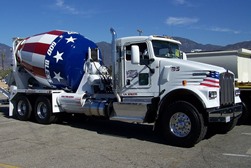How to Choose the Right CDL Training School near Ontario California
 Congrats on your decision to become a truck driver and enroll in a truck driving school near Ontario CA. Maybe it has always been your fantasy to hit the open highway while operating a huge tractor trailer. Or maybe you have done some research and have discovered that an occupation as a truck driver provides excellent pay and flexible job opportunities. Regardless of what your reason is, it's essential to receive the appropriate training by enrolling in the right CDL school in your area. When reviewing your options, there are certain factors that you'll want to consider before making your ultimate choice. Location will no doubt be important, particularly if you have to commute from your Ontario home. The expense will also be of importance, but selecting a school based only on price is not the optimal way to make sure you'll get the right training. Just remember, your objective is to master the skills and knowledge that will enable you to pass the CDL examinations and become a professional truck driver. So keeping that target in mind, just how do you choose a truck driving school? That is what we are going to cover in the remainder of this article. But first, we are going to talk a little bit about which CDL license you will eventually need.
Congrats on your decision to become a truck driver and enroll in a truck driving school near Ontario CA. Maybe it has always been your fantasy to hit the open highway while operating a huge tractor trailer. Or maybe you have done some research and have discovered that an occupation as a truck driver provides excellent pay and flexible job opportunities. Regardless of what your reason is, it's essential to receive the appropriate training by enrolling in the right CDL school in your area. When reviewing your options, there are certain factors that you'll want to consider before making your ultimate choice. Location will no doubt be important, particularly if you have to commute from your Ontario home. The expense will also be of importance, but selecting a school based only on price is not the optimal way to make sure you'll get the right training. Just remember, your objective is to master the skills and knowledge that will enable you to pass the CDL examinations and become a professional truck driver. So keeping that target in mind, just how do you choose a truck driving school? That is what we are going to cover in the remainder of this article. But first, we are going to talk a little bit about which CDL license you will eventually need.
Which Commercial Drivers License Is Required?

In order to drive commercial vehicles legally within the United States and Ontario CA, an operator must attain a CDL (Commercial Driver's License). The three classes of licenses that a driver can apply for are Class A, Class B and Class C. Given that the subject of this article is how to select a truck driver school, we will address Class A and B licenses. What differentiates each class of CDL is the type of vehicle that the driver can operate in addition to the GVWR (Gross Vehicle Weight Rating) or GCWR (Gross Combination Weight Rating). Below are short summaries for the 2 classes.
Class A CDL. A Class A CDL is required to drive any vehicle that has a GCWR of greater than 26,000 lbs., including a towed vehicle of more than 10,000 lbs. A few of the vehicles that operators may be able to drive with Class A licenses are:
- Interstate or Intrastate Tractor Trailers
- Trucks with Double or Triple Trailers
- Tanker Trucks
- Livestock Carriers
- Class B and Class C Vehicles
Class B CDL. A Class B CDL is required to operate single vehicles having a GVWR of more than 26,000 lbs., or a GCWR of greater than 26,000 lbs. including a towed vehicle weighing up to 10,000 lbs. A few of the vehicles that drivers may be qualified to operate with Class B licenses are:
- Tractor Trailers
- Dump Trucks
- Cement Mixers
- Large Buses
- Class C Vehicles
Both Class A and Class B Commercial Drivers Licenses may also need endorsements to drive specific types of vehicles, for instance passenger or school buses. And a Class A licensee, with the appropriate required endorsements, can operate any vehicle that a Class B licensee is authorized to operate.
How to Research a Trucker School

Once you have decided which CDL you would like to obtain, you can start the undertaking of researching the Ontario CA trucking schools that you are considering. As already mentioned, cost and location will certainly be your initial concerns. But it can't be stressed enough that they must not be your sole concerns. Other issues, such as the reputations of the schools or the experience of the instructors are similarly if not more important. So below are several additional factors that you need to research while performing your due diligence before enrolling in, and particularly paying for, your truck driving training.
Are the Schools Certified or Accredited ? Very few truck driver schools in the Ontario CA area are accredited due to the demanding process and expense to the schools. However, certification is more typical and is offered by the Professional Truck Driver Institute (PTDI). A school is not required to become certified, but there are a number of advantages. Interested students know that the training will be of the highest caliber, and that they will get plenty of driving time. For example, PTDI requires 44 hours of real driving time, not simulations or ride-alongs. So if a school's course is certified (the course, not the school is certified), students know that the training and curriculum will fulfill the very high standards set by PTDI.
How Long in Operation? One indicator to help measure the quality of a truck driving school is how long it has been in business. A poorly ranked or a fly by night school typically will not stay in business very long, so longevity is a plus. Having said that, even the top Ontario CA schools had to begin from their opening day of training, so use it as one of multiple qualifications. You can also find out what the school's track record is relating to successful licensing and job placement of its graduates. If a school won't share those stats, search elsewhere. The schools should additionally have associations with local and national trucking firms. Having a large number of contacts not only points to a quality reputation within the trade, but also boosts their job assistance program for students. It also wouldn't be a bad idea to get in touch with the California licensing department to verify that the CDL trucking schools you are considering are in good standing.
How Good is the Training? At a minimum, the schools should be licensed in California and employ teachers that are experienced and trained. We will cover more about the teachers in the next segment. In addition, the student to instructor ratio should not be greater than 4 to 1. If it's any higher, then students will not be receiving the personal attention they will need. This is particularly true concerning the one-on-one instruction for behind the wheel training. And watch out for any school that claims it can teach you to be a truck driver in a relatively short time period. Training to be an operator and to drive a tractor trailer professionally takes time. Most Ontario CA schools provide training courses that range from three weeks to as long as 2 months, depending on the class of license or type of vehicle.
How Experienced are the Instructors? As earlier stated, it's important that the teachers are trained to teach driving methods and experienced as both drivers and instructors. Although a number of states have minimum driving time requirements to qualify as an instructor, the more professional driving experience a teacher has the better. It's also vital that the teachers stay up to date with industry developments or any new regulations or changes in existing laws. Assessing instructors may be a little more intuitive than other standards, and possibly the best method is to pay a visit to the school and speak with the teachers face to face. You can also speak with a few of the students going through the training and ask if they are happy with the quality of instruction and the teacher's qualification to train them.
Plenty of Driving Time? Above all else, a great truck driver school will furnish sufficient driving time to its students. Besides, isn't that what it's all about? Driving time is the actual time spent behind the wheel driving a truck. While the use of ride-a-longs with other students and simulators are necessary training methods, they are no alternative for actual driving. The more instruction that a student receives behind the wheel, the better driver she or he will be. And even though driving time fluctuates among schools, a good standard is 32 hours at a minimum. If the school is PTDI certified, it will furnish no less than 44 hours of driving time. Check with the Ontario CA schools you are looking at and ask how much driving time they furnish.
Are they Captive or Independent ? You can receive free or discounted training from a number of truck driving schools if you make a commitment to be a driver for a specified carrier for a defined period of time. This is called contract training, and the schools that offer it are called captives. So instead of maintaining associations with many different trucking lines that they can refer their students to, captives only refer to one company. The benefit is receiving less expensive or even free training by giving up the flexibility to initially work wherever you have an opportunity. Clearly contract training has the potential to restrict your income opportunities when beginning your new career. But for some it may be the ideal way to receive affordable training. Just remember to inquire if the Ontario CA schools you are looking at are independent or captive so that you can make an informed decision.
Provide Onsite CDL Testing? There are several states that will allow 3rd party CDL testing onsite of trucking schools for its students. If onsite testing is permitted in California, ask if the schools you are looking at are DMV certified to provide it. One benefit is that it is more convenient than competing with graduates from other schools for test times at California testing centers. It is also an indication that the DMV views the approved schools to be of a higher quality.
Are the Class Times Convenient? As previously noted, truck driving training is just one to two months in length. With such a short duration, it's essential that the Ontario CA school you enroll in provides flexibility for both the scheduling of classes and the curriculum. As an example, if you're having a hard time learning a certain driving maneuver, then the instructor should be willing to commit more time with you until you have it mastered. And if you're still working while going to training, then the class scheduling must be flexible enough to accommodate working hours or other commitments.
Is Job Placement Offered? The moment you have attained your CDL license after graduating from trucking school, you will be keen to begin your new profession. Confirm that the schools you are reviewing have job assistance programs. Find out what their job placement ratio is and what average salary their graduates start at. Also, find out which local and national trucking firms their graduates are referred to for hiring. If a school has a lower job placement rate or few Ontario CA employers hiring their grads, it might be a clue to search elsewhere.
Is Financial Aid Offered? Truck driver schools are similar to colleges and other Ontario CA area vocational or trade schools when it comes to loans and other forms of financial assistance being offered. Find out if the schools you are evaluating have a financial aid department, or at least someone who can help you understand the options and forms that must be completed.
Learn More About Ontario Trucking Schools
Select the Right Ontario CA Truck Driver Training
Choosing the appropriate trucking school is a critical first step to launching your new occupation as a local or long distance truck driver. The skill sets taught at school will be those that mold a new career behind the wheel. There are many options offered and understanding them is critical if you are going to succeed as an operator. However, you must obtain the necessary training in order to drive a large commercial vehicle in a professional and safe manner. If you are lacking funds or financing, you might need to think about a captive school. You will pay a lower or in some cases no tuition by agreeing to drive for their contracted carrier. Or you can choose an independent truck driving school and have the the freedom to drive for the trucking firm of your choice, or one of many affiliated with the school. It's your decision. But no matter how you receive your training, you will in the near future be joining a profession that helps America move as a professional trucker in Ontario CA.
